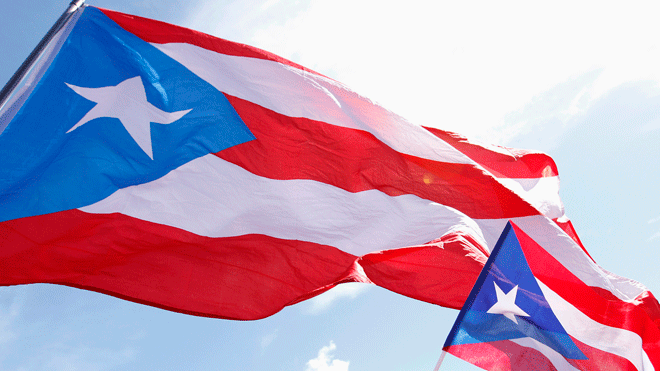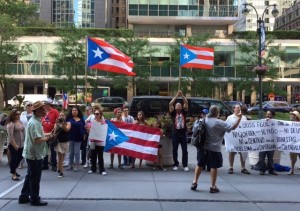
The Puerto Rico debt crisis and American colonialism
THE POLITICAL CONSEQUENCES OF FEDERAL INACTION
After endless discussions on Puerto Rico’s massive $72 billion debt, it is clear that much needs to be done in Puerto Rico itself to reform its practices and priorities. However, current federal proposals to address the Island’s de facto bankruptcy will not resolve the debt crisis.
Absent a common sense solution, Puerto Rico’s crisis will deepen, meaning massive increases in already high unemployment and poverty, and out-migration to the U.S. (10% of Puerto Rico has left to the U.S. since 2010).
Puerto Rico, one of a handful of western colonies remaining in the world and the United States’ largest colony, suffers from its current fiscal crisis because of its 117 year-old, uniquely subordinate relationship to the United States. As a colony, Puerto Rico is in a political twilight zone where it has neither the rights nor standing of a state of the U.S. nor of a sovereign nation.
Mentioned publicly in the same sentence to debt crisis situations in Greece and Detroit, Puerto Rico suffers such comparisons since it can neither negotiate a bailout on its debt (like Greece) nor gain bankruptcy protection (like Detroit).
Stateside, there appears to be a consensus among Puerto Rican leaders that the Congress needs to allow Puerto Rico to fall in a limited way under U.S. bankruptcy laws, a position gaining traction with some U.S. presidential candidates as well.
While at present there is no will in Congress or the White House to support such legislation, the reality is that passing limited bankruptcy protection would not adequately address the underlying economic problems of Puerto Rico. It is also interesting that the Koch brothers’ have proposed that Congress establish a financial control board to take over Puerto Rico’s finances that would prioritize protecting the profits of the hedge funds and other bondholders above the best interests of the vast majority of the Puerto Rican people.
The federal government needs to accept responsibility for its colonialist past and present, and provide a comprehensive approach to solving the debt crisis that, for starters, should include the following elements:
- Congressional action to allow Puerto Rico to apply for bankruptcy protection. This would start by passing the Puerto Rico Chapter 9 Uniformity Act of 2014 that would empower the government of the U.S. territory of Puerto Rico to authorize certain government-owned corporations to restructure their debt obligations in a well-established orderly manner under Chapter 9 of the U.S. Bankruptcy Code.
- Congressional exemption of Puerto Rico from The Merchant Marine Act of 1920 (P.L. 66-261, also known as the Jones Act) that deals with cabotage (i.e., coastal shipping), freeing Puerto from the requirement that all goods transported by water between U.S. ports be carried on U.S.-flag ships, constructed in the United States, owned by U.S. citizens, and crewed by U.S. citizens and U.S. permanent residents. This will help lower the costs of doing business in Puerto Rico as well as create local jobs.
- Congressional adoption of legislation like what was Section 936 of the Internal Revenue Code (which was ended in 2006) that gave United States companies an exemption from Federal taxes on income earned in Puerto Rico, whether it came from operations or interest on local bank deposits, Such tax credits need to require significant reinvestment within Puerto Rico tied to job creation.
The United States owes much to Puerto Rico, whose people became second class U.S. citizens through military conquest, have been a source of profits for U.S. corporations, have served in the thousands in the U.S. military, and have had their Island used as the site of U.S. military bases. In light of this history and relationship, the United States cannot simply wash its hands of the deep problems stemming from its colonial legacy.
If Congress and the White House fail to seriously address Puerto Rico’s financial crisis, it should be clear to Puerto Ricans that now is time the to change the equation. International law is clear that colonies should end either through granting sovereign independence or full incorporation into the metropole. The current Commonwealth (or “Free Associated State”) formula has clearly outlived its ideological usefulness as a cover for what is clearly an outdated colonial relationship.
2016 may be the year to call the question in Congress. It is, after all and however politically perverse, this dysfunctional U.S. Congress that currently has the sole power to grant statehood or independence to the Puerto Rican people!
Antonio Gonzalez is President of the William C. Velasquez Institute, based in San Antonio and Los Angeles; and Angelo Falcón is President of the National Institute for Latino Policy (NiLP), based in New York City.


